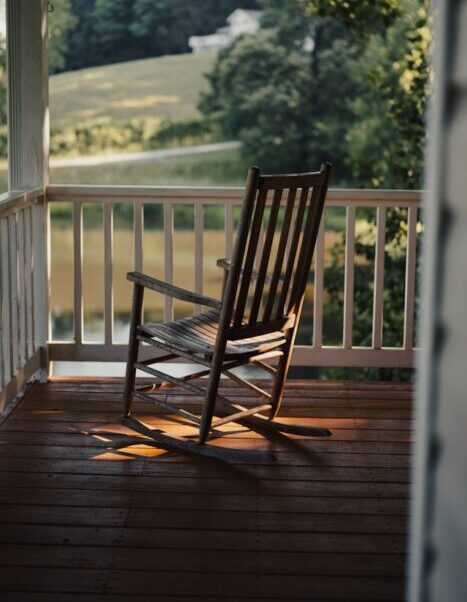Angry Farm
I grew up on a farm that stretched a mile in all directions. The stench of wet manure after a
heavy rain, the chafe of threshed wheat dust against skin, and the chickens that clucked
whenever interrupted; these were my childhood norms. Here, I could find solitude amongst knee-
high grass without a man, machine, or monster in sight. Occasionally, a pesky mouse would
skitter nearby despite the felines we employed.
The folk-style farmhouse I called home had dusty single-pane windows dating back to the
beginning of the century, plaster walls that broke off in places to reveal wooden ribs, and a log
stove that matched my height at age five.
Warmed within those walls, Mom kept food on the table, clothes on my back, and the bills paid.
She filled her free time with a collage of crafts, her hands never idle. Those habits endowed me
with similar energy.
As for Dad, he rarely smiled. Built like a seasoned ox that tilled fields daily, he never idled long
either. Between feeding hay to the cattle, repairing the farm machinery, driving an hour for
supplies, or spending the day steering the tractor, he only rested for thirty minutes after eating
lunch.
Even at night, I don’t think he ever danced too long with the sandman, always keeping an ear
pinned to this world. Coyotes howling near the herd, a random vehicle driving our out-of-the-
way dirt road, or the bellows of a laboring cow would rush him out of bed.
One summer evening, we ate Mom’s homemade bread with sliced cheddar cheese for supper. As
I chewed on a fresh piece from the oven, my parents started arguing – something about debts.
Both of them yelled louder and louder, a tornado of sound within our compact walls, until Dad
slapped the table and got up. “Fine! I’m leaving.” He stormed out of the room and onto the
porch.
Mom stood there frozen, tears welling in her eyes, as she met my confused stare. “Get out there
and tell him not to leave.”
Stunned, I scrambled to understand what had transpired. More importantly, why did I need to
go? I didn’t want Dad to yell at me either. “What?” I resisted. Thoughts raced through my young
mind, but I could tell from Mom’s sunken glare that she was desperate.
If Dad left as angry as he was, he might never return.
She played her last card, her ace: me. “Go!” She demanded.
Childhood obedience driving my feet, I headed to the door, twisted the knob, and caught sight of
Dad as he slid his second boot on. Although dust was second nature on a farm, we tried to avert
it by leaving our footwear on the porch. If it hadn’t been for that delay, I would have been too
late.
Dad looked at me, still angry as a hornet in gasoline. His blue eyes glowed like an icy fire.
In the strongest voice I could muster, I asked, “Where are you going, Dad?”
Jaw clenched, his words squeezed out. “I don’t know.”
Mom’s desperation gripped me. “Will you come back?”
He didn’t respond; I didn’t dare repeat myself.
A heavy sigh escaped as he scrutinized me. I hoped he wasn’t going to yell. Between gritted
teeth, he forced out a “Yes” before he walked out.
I prayed he meant it.
I shuffled back to the kitchen. Mom sat at the table, distraught, and looked how I felt – empty. If
he didn’t return, then what? I tried to reassure her, “He’s just taking a walk,” but I couldn’t help
wondering if I would end up like my friend Shane, who only had one parent.
As I sat there trying to understand everything, more questions emerged. Why did they get so
upset? What did debt mean? Nothing made sense. And worse, the outcome remained unknown.
My parents had argued before, but never like this. Was Dad going to come home?
So much uncertainty for my naive mind to process. Being used like a pawn seared a scar on my
heart that night.
Now close to fifty, I could still feel that scar smolder every time my temper ignited.
Yesterday, when I argued with my wife about moving a table, my fickleness stoked my fury to
the point that I too threatened to leave. She couldn’t believe what was happening. That old scar
flared like a stoked hearth. It reminded me to reconsider my next steps. Something so stupid
didn’t justify my wife in tears. Nothing did.
I back-peddled. “I was wrong.” The words had been cast, carved into clouds I could never reach.
A thrown stone I could never recover. “I’m sorry,” I repeated, again and again.
A week later, as I stood beside my father’s bed, I finally understood how strong he really was. I
knelt down and whispered in his ear, “Thank you Dad for not leaving.” His eyes closed as he left
this world.

Calvin P. Crawford works full-time at a school district writing software during the day while forging himself into a suspense writer at night. He is currently working on his first novel, which is a dark murder-mystery focused on making the most of second chances.



